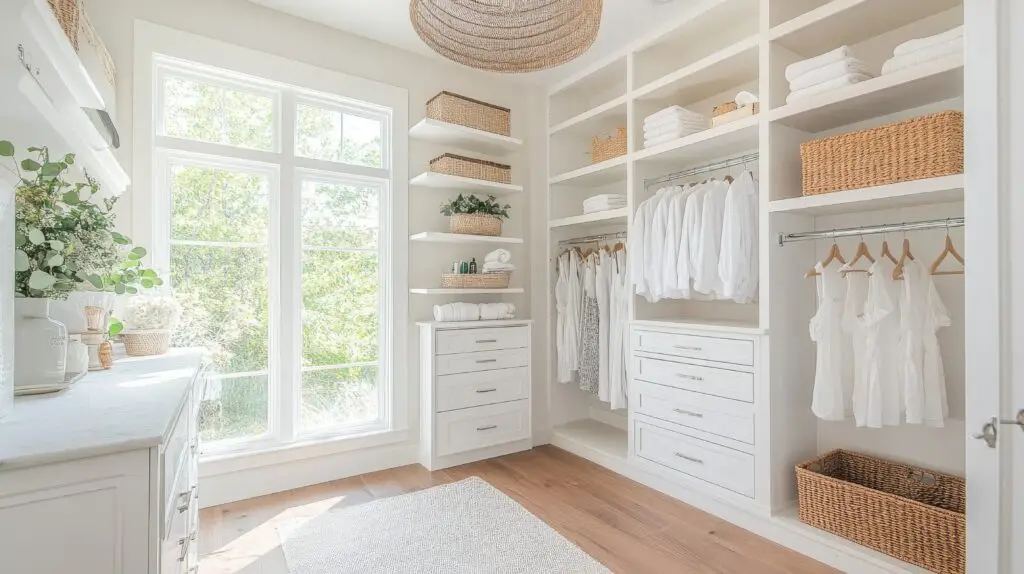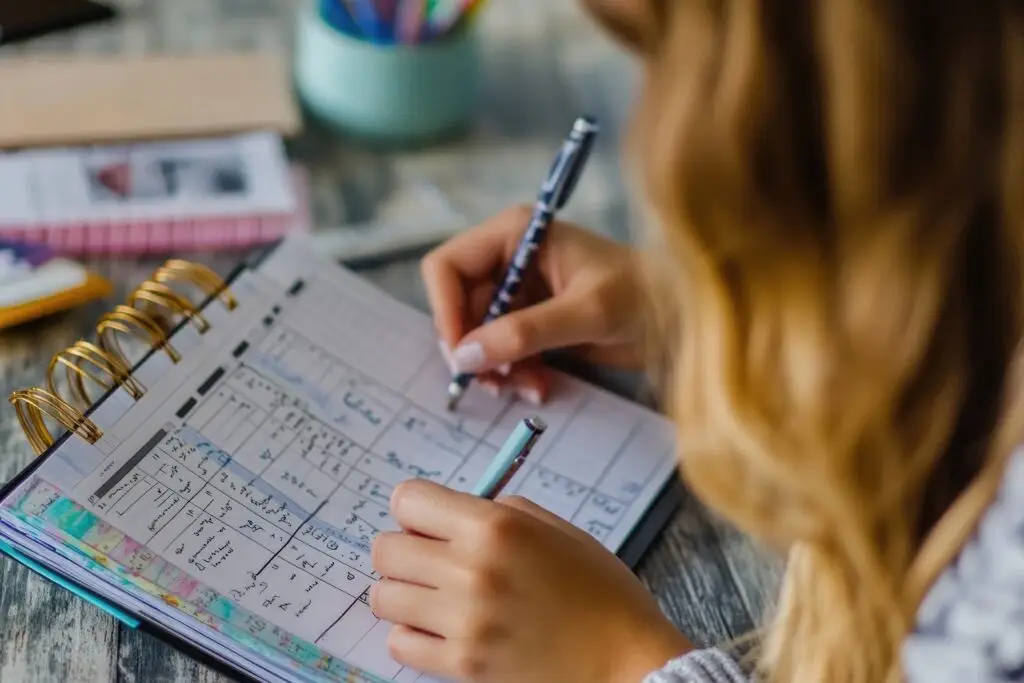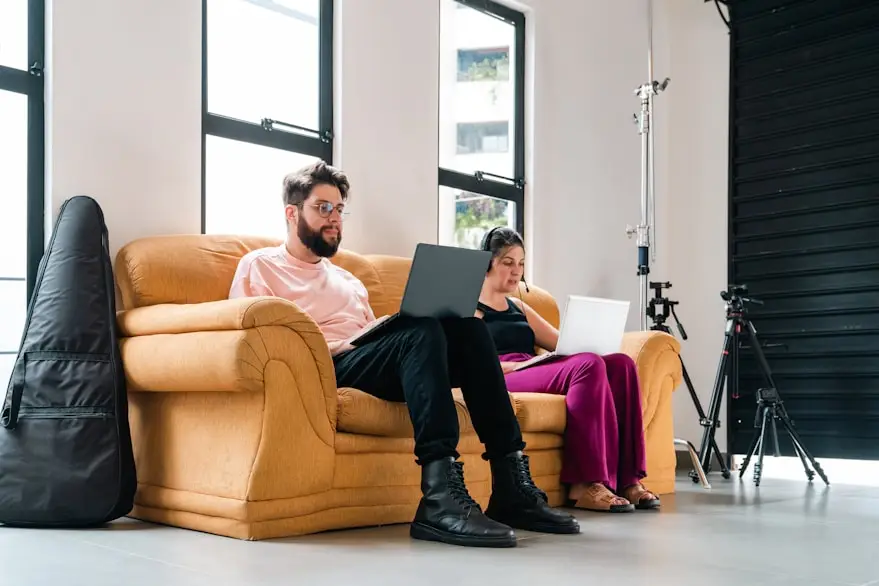Are You Addicted to “Org Porn?”

Imperfection is the Key to Getting Organized Ever found yourself scrolling endlessly through perfectly organized pantries or immaculate closets on social media, only to end up feeling stressed and overwhelmed about your own space? You’re not alone. This phenomenon—known as “org porn”—can often make you feel overwhelmed, fueling mental clutter and negative thoughts about your own ability to get organized. What Exactly Is Org Porn? Org porn is the curated, flawless portrayal of organized spaces and daily tasks you see everywhere, especially on social media. While these images can initially boost your motivation and inspire you, too much exposure can increase your mental load, creating unrealistic expectations for yourself, your home, and even your family members. The Hidden Costs of Org Porn As much as those picture-perfect closets and spotless kitchens might promise relief from your cluttered reality, they frequently deliver the opposite: Increased stress and anxiety: Always comparing your home to perfect online images can add to your mental clutter. This can make you feel like you are never good enough. Overspending: Trying to copy these perfectly arranged spaces can make you buy costly organization products you don’t really need. Strained relationships: Unrealistic standards can lead to frustration when family members or friends don’t live up to the idealized expectations you’ve created from scrolling through social media. Feeling Stuck? It’s Time to Get Unstuck One of the most common side-effects of org porn is organizational inertia—when you feel overwhelmed and don’t know how to start. If perfection is your standard, it’s easy to become paralyzed, making it almost impossible to stop procrastinating. Instead of getting caught in this paralysis, break tasks into smaller steps. Taking manageable actions helps you reduce stress and get unstuck, building momentum to get organized sustainably. Take Rosemary, a finance director and busy mom, who emphasizes it’s crucial not to “major in the minors.” Prioritize your tasks by focusing only on what truly matters in the present moment and let go of less critical details. This approach significantly decreases the mental load and helps you tackle the most important things effectively. Flip the Script: Mindful Organization Over Perfection If you’re ready to break free from org porn addiction and reduce your mental load, shift your perspective. Instead of chasing airbrushed perfection, practice mindfulness by focusing on the present moment and your true goals: Reduce stress: Incorporate deep breathing and mindfulness exercises before tackling organizational projects. Mindfulness can help ground you, making it easier to handle mental clutter and reduce anxiety associated with getting organized. Define your why: Clarify your motivations—whether it’s reducing daily anxiety, spending quality time with friends and family, or freeing up mental space. By clearly defining your purpose, you can more easily determine your own realistic standards for success. Seek realistic inspiration: Use achievable ideas rather than unrealistic images from social media to maintain practical motivation. Understand that these images are often staged and impractical in real-life scenarios. Embrace Imperfect Organization At Buttoned Up, we strongly advocate for the concept of imperfect organization—a practical approach that emphasizes functionality over perfection. Life is unpredictable and messy, and organizational perfection is neither sustainable nor desirable. Letting go of unrealistic standards can dramatically reduce feelings of inadequacy and frustration. Embracing imperfection doesn’t mean giving up on organization; rather, it means redefining what organized means to you personally. Maybe your home doesn’t look like a Pinterest board, but if you have systems that help you effectively manage daily tasks, reduce stress, and eliminate mental clutter, then you’re successfully organized. Delegate and Share the Load Another powerful strategy to lighten your mental load and reduce stress is learning to delegate effectively. Often, individuals—particularly women—take on too much, feeling solely responsible for keeping everything in order. Learning to share tasks with family, friends, or professionals can help reduce feelings of being overwhelmed. This lets you focus on what matters most. Clear communication about expectations and outcomes, coupled with the willingness to let others complete tasks in their own way, can create more breathing room in your life and ease your journey toward a healthier, more balanced form of organization. Bottom Line True organization isn’t about perfection; it’s about creating spaces and routines that genuinely make you feel good, help you stop procrastinating, and function well in your real, messy, beautiful life. Next time you catch yourself spiraling after an org porn binge, pause, breathe deeply, and remember: small steps forward are always better—and healthier—than chasing impossible perfection. Ever found yourself scrolling endlessly through perfectly organized pantries or immaculate closets on social media, only to end up feeling stressed and overwhelmed about your own space? You’re not alone. This phenomenon—known as “org porn”—can often make you feel overwhelmed, fueling mental clutter and negative thoughts about your own ability to get organized. What Exactly Is Org Porn? Org porn is the curated, flawless portrayal of organized spaces and daily tasks you see everywhere, especially on social media. While these images can initially boost your motivation tips and inspire you, too much exposure can increase your mental load, creating unrealistic expectations for yourself, your home, and even your family members. The Hidden Costs of Org Porn As much as those picture-perfect closets and spotless kitchens might promise relief from your cluttered reality, they frequently deliver the opposite: Increased stress and anxiety: Constantly comparing your home to curated online images can intensify mental clutter, making you feel like you’re never good enough. Overspending: Trying to copy these perfectly arranged spaces can make you buy costly organization products you don’t really need. Strained relationships: Unrealistic standards can lead to frustration when family members or friends don’t live up to the idealized expectations you’ve created from scrolling through social media. Feeling Overwhelmed? Here’s How to Get Unstuck. One of the most common side-effects of org porn is organizational inertia—when you feel overwhelmed and don’t know how to start. If perfection is your standard, it’s easy to stop procrastinating impossible. Instead of getting caught in this paralysis, it’s important to break tasks into smaller
Kickstart Your Organized Life Today!

Small Steps. Big Shifts. A Saner, More Organized Life Starts Now Ever found yourself scrambling to find your keys—again—or digging through a pile of mail to locate an overdue bill? You’re not alone. Clutter and disorganization have a sneaky way of sabotaging our productivity, elevating stress, and draining mental energy. If you’ve ever wondered how I can organize my life when things feel too chaotic, without feeling overwhelmed or losing momentum, you’re in the right place. The good news? You don’t need to be naturally meticulous or invest in a fleet of matching storage bins. What you do need are practical strategies grounded in psychology and behavior science—and a willingness to take small but consistent steps. In this guide, we’ll explore realistic, evidence-based steps to organize your life. Whether you’re trying to organize everything all at once or wondering how to organize your life in one week, you’ll find doable, motivating strategies here. , evidence-based organizing tips and strategies to help you reclaim your time, reduce friction in your daily routine, and cultivate the clarity you need to thrive—not just for a day or two, but for the long term. The Time We Lose to Disorganization Most of us underestimate the cumulative impact of disorganization. The average person spends close to an hour a day looking for misplaced items. Over the course of a year, that’s over 180 hours—the equivalent of two full workweeks. Now consider this: what would your week look like with an extra hour a day? That’s time you could invest in your studies, career development, hobbies, wellness, or simply decompressing. Disorganization doesn’t just cause minor annoyances—it undermines your ability to function at your best: It delays your decision-making It introduces cognitive friction It disrupts your routines It exacerbates anxiety and stress A Closer Look at the Costs The costs of clutter are multifaceted: Emotionally, it generates a low-grade background stress that’s difficult to turn off Financially, it leads to late fees, missed deadlines, and unnecessary repurchases that derail your financial goals Cognitively, it consumes bandwidth that could be better spent on meaningful pursuits It also compromises creativity, impedes learning, and, in some cases, contributes to feelings of shame or helplessness. For students or young professionals, these effects compound under pressure. No wonder so many of us find ourselves stuck in a loop, struggling with overcoming procrastination and overwhelm whenever we consider getting our lives organized. Why Getting Organized is a High-Leverage Move Before we get into the personal benefits, it’s worth taking a look at what the research says. Study after study confirms that clutter doesn’t just crowd your home or workspace—it clouds your brain. A UCLA study of dual-income families found a direct link between high cortisol levels (a stress hormone) and the density of household objects. In short: more stuff equals more stress, especially for women. Research published in the Personality and Social Psychology Bulletin found that individuals who described their homes as “cluttered” or “unfinished” experienced more depressed moods throughout the day than those who described their homes as “restful” and “restorative.” Meanwhile, researchers at Princeton University Neuroscience Institute discovered that physical clutter in your environment competes for your attention, resulting in decreased performance and increased stress. The conclusion? Your brain functions better in an organized space. Productivity experts agree. According to a 2022 report from the National Association of Productivity & Organizing Professionals (NAPO), people who develop simple organizing systems increase their efficiency by up to 30%. That’s not a nice-to-have—that’s a game-changer. These insights reinforce what you probably already feel in your gut: when your environment is clean and streamlined, it’s easier to think, create, and connect. So what’s the upside? Why is getting started with organizing—a concept that lies at the heart of building sustainable change worth your time? 1. You Gain Back Control Over Your Time Even reclaiming 30 minutes a day results in over 180 hours a year—time that can be redirected toward academic progress, professional goals, meal planning, or meaningful self-care. 2. Your Mental Load Lightens Clutter creates decision fatigue. When your physical space is in disarray, your mind mirrors that chaos. Organizing your environment leads to: Improved executive function Sharper focus Greater sense of autonomy and competence Tangible benefits to mental health 3. Your Relationships Improve When your environment is more intentional, communication becomes smoother, tensions decrease, and you show up with greater presence and bandwidth for the people in your life. 4. You Create a Growth-Oriented Environment Discipline doesn’t thrive in chaos. When your physical environment is organized, your internal environment is primed for growth—whether that’s learning a new skill, setting a personal goal, or launching a creative project. You’ll not only be able to stay on top of your tasks, but also develop the kind of habits that support your long-term goals. The Psychology of Organization: Why It Feels So Hard to Start Getting organized isn’t as simple as making a to-do list. It often involves: Letting go of sentimental attachments Facing avoided decisions Acknowledging bad habits that no longer serve you Which is why organizing isn’t just a physical act—it’s a psychological one. That stack of unread mail? It might represent financial decisions you’ve been avoiding. That overflowing closet? A lingering attachment to a former version of yourself. If getting started with organizing feels like a mental block, you’re not imagining it. There’s also the paradox of perfection: waiting until you can do it “right” often results in doing nothing at all. Fortunately, there are strategies for overcoming procrastination and overwhelm that make the process approachable and even rewarding. Common Emotional Barriers to Getting Organized 1. Fear of Letting Go Sometimes the hardest part isn’t figuring out where to start—it’s parting with things that have meaning. You might keep something “just in case” or because it holds a memory. But it’s worth asking: is this item serving your present life or anchoring you to the past? 2. Perfectionism If you’ve ever delayed organizing because you couldn’t do it perfectly, you’re not
How to Define ‘Organized’ for Yourself

When it comes to organization, there’s no one-size-fits-all solution. What feels tidy and manageable for one person might feel too strict or insufficient for another. That’s why defining ‘organized’ is deeply personal—and essential to creating a life that truly works for you.

